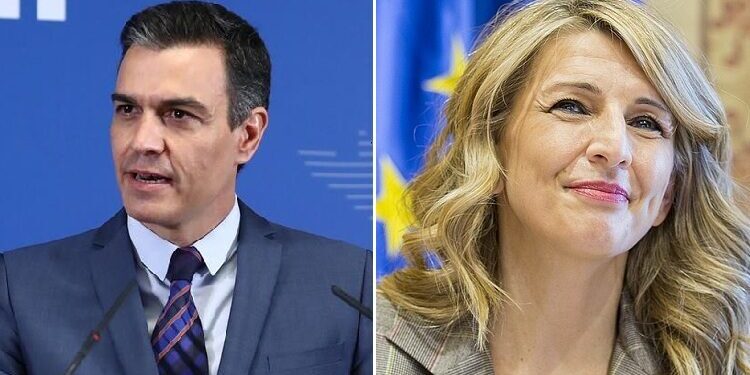Ángel Collado
The President of the Government, Pedro Sánchez, has just celebrated his second anniversary in power, strengthened by his parliamentary majority, but with partners who are preparing for him a January slope full of bills.
The far-left allies, Basque nationalists, Catalan pro-independence supporters and the political heirs of ETA are presenting their particular demands, while the government faces the validation in Congress of its mini labour counter-reform and the PSOE faces an unexpected appointment with the polls in the regional elections in Castilla y León on 13 February.
Two years after dizzying the entire conglomerate of parties that invested him as head of the Executive with the promise to repeal the labour legislation in force since 2012, that of the last PP government, Sánchez circumvented the Cortes and resorted to the route of the decree to impose some changes in the matter that he had only agreed with the communist sector of the cabinet headed by Yolanda Díaz.
The urgency was dictated by Brussels, as it had until 1 January to comply with a key requirement for receiving European aid: that it would respect the basic framework of current labour relations. There was no derogation. It has been enough for Díaz to give back to the unions the power they lost almost ten years ago and to chalk up for her personal career as Pablo Iglesias’ heir the success of an agreement that also has the backing of the big employers’ association, the CEOE.
The first problem for the government is that the corresponding decree has to be validated by Congress before the end of January and, for the moment, it can only count on 155 votes in favour (the 120 of the PSOE plus the 35 of Podemos) in a House made up of 350 members. Now he has to please the Catalan pro-independence ERC, the nationalists of the PNV and the Batasunos of Bildu, who have a total of 24 seats that are fundamental to all of Sánchez’s projects. Then it remains for him to convince the rest of the far-left parties.
The Basque nationalists have already put on the table a demand that would be another blow to the battered unity of the Spanish economic market: that regional agreements prevail over national ones in collective bargaining, at least in the case of the autonomous region controlled by the PNV.
At the same time, the Catalan separatists, through the president of the Generalitat, Pere Aragonés, are already asking for an appointment to negotiate with the government to make concrete concessions in their plans for the secession of Catalonia. And all the extreme left and pro-independence groups, including Podemos, have this weekend joined the demonstrations held in the Basque Country and Navarre to demand prison benefits for ETA terrorists.
The government’s partners are aware of Sánchez’s generosity in budgetary matters, the central state’s competences and image laundering in the case of Bildu. They have the precedents of investment privileges in Catalonia, of the mass transfer of ETA members to prisons in the Basque Country, of handing over prison powers to the Government, of pardons for those convicted of the 2017 coup attempt and of looking the other way in the face of the persecution of Castilian Spanish by the Generalitat.
In case the negotiations with his partners on the labour reform get complicated, Sánchez is groping Ciudadanos (only 10 MPs) and at the same time pressuring the head of the opposition, Pablo Casado, through the employers’ association and the government media to abstain. The operation, which is unlikely to succeed, is based on the argument that since the government has not fulfilled its promise to repeal the 2012 reform, the PP has to endorse the changes introduced by the social-communist cabinet because they have been accepted by the CEOE, albeit reluctantly.
In the PP they defend their autonomy, recall that they have not been invited to the negotiation and dream that Sánchez will resort to his wild card in these cases: the extreme right of Vox. Last January, Santiago Abascal’s party saved the government in a similar situation, when it did not have a majority for the decree with which it took control of the distribution of European funds, the 70 billion euros in non-refundable funds that have given so much stability to the coalition government. Vox abstained at the behest of business and received public praise from Sánchez, who was delighted not to have to negotiate with the PP on the creation of an independent body to monitor investments, which is what the parliamentary rejection of his decree would have forced him to do.
Now, with elections in Castilla y León on 13 February, Sánchez has to measure or postpone public concessions to his allies, and it will be difficult for him to turn to Vox in a January slope that will increase the price of his stability in power.






